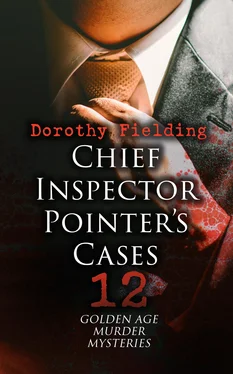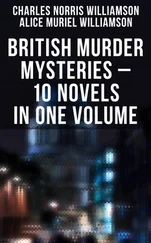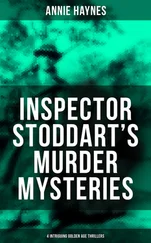"Of course," Pointer echoed politely.
Tangye shot him a glance, but the Chief Inspector took his leave without further comment. He was due in the Assistant Commissioner's room.
Pointer and his superiors at New Scotland Yard did not see eye to eye about Mrs. Tangye's death. The Assistant Commissioner agreed with Wilmot that only a very active fancy could find a crime in it. Barbara Ash's little story gave Captain Pelham food for thought, however, and he sat awhile digesting it.
"Looks as though you were going to be right once again, Pointer, in that it was a murder, but mistaken in your theory of how it happened."
"I don't think that's possible," Pointer was never conceited, but he spoke very firmly. "In many cases, my theory might be wrong or right, and yet the case would stand. But not here. Either Mrs. Tangye was murdered as I imagine, or she wasn't murdered at all. It's that cousin of her's, Oliver, that complicates all the reasoning."
"You mean that if he dove-tailed with the murderer by chance, or intention, your idea of an appointment in the Riverview morning-room loses all its force? That's one of the things I want to talk to you about.
"We've had a private report from a man whom, even to you, I can only call Captain X. He's been doing some secret service work in Morocco. Personally, from what he told me, I haven't the shadow of a doubt that the Olivier whom the French shot was Oliver Headly. In in any case, Oliver was a doomed man from the time the French and Spaniards joined forces. He knew too much. And he knew it too accurately. When they caught him, he got a note through to Captain X, giving him some very important information. Unfortunately he had clearly sent a. previous note which never reached its billet. The Riffs caught the carrier, X thinks. In this second note he winds up with 'Don't forget the message to my cousin.' He signs his note, as he always did, merely with a circle. X says he met Olivier and is absolutely sure that he was an Englishman, a man of education, a bad hat, and a plucky devil. His age he puts at the age Headly would be now, and he once saw a book in his possession with the initials O. H. inside it. I think all this rules Mrs. Tangye's cousin out. Of course there's just a chance that he wasn't Olivier, and therefore, may still be alive, but I think it's hardly worth considering. Meanwhile, there's another point.
"Vardon's uncle, he's an M.P. for God knows where, has been writing to us," Pelham went on pensively. He was a long, loose-limbed, clever-looking man "A nasty note. Wants to know if we are armed with lettres de cachet, and threatens to set the press on to asking if Habeas Corpus is dead or not. We've got to let Vardon go. Or arrest him. That's an order from on high. Now, what shall it be?"
Pointer had expected this.
"Very good, sir. Vardon shall be told at once that he can go where he likes. Fortunately where he likes will be Patagonia."
"I'm glad that's your idea of good fortune. I suppose you chatter Patagonian too, like a native, and will be off there before we know where you are?"
Pointer laughed.
"No, sir, I'm not interested in Patagonia—so far. What I mean is that he'll be practically under observation all the time. I shall tell him that we have no objection to his leaving, and ask the captain of whatever ship he chooses to keep an eye on him. If I may, I'll telephone the good news to him at once."
"So Oliver Headly, the cousin, is out of it. Well, as a matter of fact, he never was really in it," came from Haviland, as he and Wilmot lunched with Pointer.
"I'm not concerned with Oliver. He's beyond our powers to investigate or locate," Pointer agreed. "At any rate, Tangye doesn't fulfil the necessary conditions. Even without Miss Saunders' support of his latest alibi. I think he's merely a frightened man, though frightened for very good reasons."
"All the facts we've been able to discover, I still consider only accidental, not incidental—from the point of view of a crime," Wilmot mused, "but had there been a crime here, I should have thought Tangye—"
"Vardon, Mr. Wilmot!" Haviland struck in, "Vardon's in the very middle of things. The keys in his luggage. That will—"
"Ah, that will!" the newspaper man frowned thoughtfully, "that will!"
"That will suggests a new thought to me," Pointer said, after a moment's pause.
"A quarrel with her husband?" Wilmot finished.
"I don't call it the will of an angry woman," Pointer continued. "No, I think—I think—there's but one explanation that fits that will. Easily. And that is that Mrs. Tangye felt that Tangye had no right to the money."
"Forfeited it, in fact, by his treatment of her?" Haviland looked a little doubtful. Wilmot only waited.
"Suppose Mrs. Tangye had been married before she met Branscombe? Married secretly. Thought her husband dead. Say he was some one—possibly a criminal—of whom she was bitterly ashamed as soon as she had married him. There are three years of her life of which we have no record, you remember. Suppose she saw down at Tunbridge last Sunday, not Tangye and anybody, but this first husband, this only legal husband whom she had thought long dead and buried—I think, that would explain everything. And that alone.
"Tangye is away Sunday. She sees to it that he's away Monday as well. He may have been speaking the truth when he tells us that that quarrel had a forced, theatrical air. She may have snatched at the pretext afforded her by his having been down at the show, just as she would have jumped at any other excuse. Her one thought, if my idea is correct, would be to get the man out of the house who isn't her husband, who never was her husband, and have a reasonable motive in the eyes of her circle, for leaving him. By the same argument, Branscombe's money reverts to his heir. She halves the sale of the farm, her only loose money, and calls in the sum invested in Tangye's firm which I think she intended to halve too."
There was a silence as he finished.
"You think that Vardon was really her husband!" Haviland ejaculated under his breath.
"Where does this lead to—?" Wilmot asked slowly, "I don't see—?"
"Vardon. That's where it leads to, Mr. Wilmot, and that's a fact."
"Vardon?" Pointer spoke meditatively—. "Maybe, but at any rate it leads, apparently, directly away from Tangye. At any rate I shall work from along a different line, and we shall see where we fetch up. Of course, it's a mere guess. But it's a guess that might account for Mrs. Tangye's wish not to have her visitor come to the front door. She would naturally be nervous about any one seeing the man who was really her husband—and, if I'm right, her only husband. It was a position which would make any woman get rattled."
"But why should he kill her?" asked Wilmot, perplexity in his voice, "this is all very interesting, very exciting even, but where does it lead to? Why the deuce should he kill her? She, him—yes. But there's no sense in his doing away with her!"
"Suppose he were a convicted felon? A sentence still hanging over him? Or, married? Has a family? Or on the eve of another marriage? He, too, may have believed her dead. Since he seems to've made no effort to come across her before. There might be reasons, many reasons, which would fit in here."
"Vardon fits in, right enough in fact," Haviland murmured. "He's in love with that pretty Miss Ash."
"Would fit! Might be reasons!" Wilmot shook his head. "Pointer, your suspicion is like the sun which only circles, but never sets."
"Still, it would fit the facts," Haviland said with enthusiasm, "and—"
"You mean it fits Vardon," Wilmot retorted tartly. "I think we're only getting more and more at sea. You're going too far and too fast, Pointer, when you take to inventing a third husband for that poor lady, or rather only one."
Читать дальше












